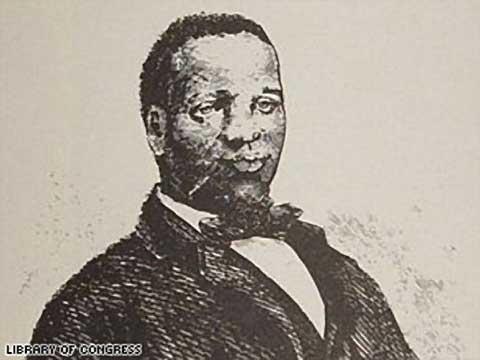|
HalfMooner
Dingaling

Philippines
15831 Posts |
 Posted - 02/20/2009 : 20:56:01 Posted - 02/20/2009 : 20:56:01



|
There's a new article at CNN.com about William Jackson, a slave who worked in the "Confederate White House" of Jefferson Davis.

Union agent William Jackson
Jackson was able to exploit the slaveholders' contemptuous practice of ignoring slaves, to overhear vital war-related conversations, and then report to Union intelligence. He, like other blacks in the South, was effectively an invisible man.Jackson was Davis' house servant and personal coachman. He learned high-level details about Confederate battle plans and movements because Davis saw him as a "piece of furniture" -- not a human, according to Ken Dagler, author of "Black Dispatches," which explores espionage by America's slaves.
"Because of his role as a menial servant, he simply was ignored," Dagler said. "So Jefferson Davis would hold conversations with military and Confederate civilian officials in his presence." |
This got me Googling a bit. There were many other blacks, both free and slave, working for the Union cause in the South. Allan Pinkerton worked as General George B. McClellan's spymaster. He employed many black agents, and considered them to be his best sources.
The CIA has an article about them.
Wikipedia has a fine article on "Black Dispatches." From that article:Equally valuable intelligence was provided to the Union Navy by black Americans. Two examples of strategic importance occurred during the late 1861-early 1862 period. Mary Touvestre, a freed slave, worked in Norfolk as a housekeeper for an engineer who was involved in the refitting and transformation of the USS Merrimack into the Virginia, the first Confederate ironclad warship. Overhearing the engineer talking about the importance of his project, she recognized the danger this new type of ship represented to the Union navy blockading Norfolk. She stole a set of plans for the ship that the engineer had brought home to work on and fled North. After a dangerous trip, she arrived in Washington and arranged a meeting with officials at the Department of the Navy.
The stolen plans and Touvestre's verbal report of the status of the ship's construction convinced the officials of the need to speed up construction of the Union's own ironclad, the USS Monitor. The Virginia, however, was able to destroy two Union frigates, the USS Congress and the USS Cumberland, and run another, the USS Minnesota, to ground before the Union ironclad's arrival. If the intelligence from Touvestre had not been obtained, the Virginia could have had several more unchallenged weeks to destroy Union ships blockading Hampton Roads and quite possibly open the port of Norfolk to urgently needed supplies from Europe. |
Another black agent was the primary source of strategic intelligence about the movement of Lee's forces in 1863. This information allowed tyhe Union to shield Washington from attack, and allowe dthem to force Lee into his disastrous battle at Gettysburg.Charlie Wright, a young black man, arrived at Union lines from Culpeper, Virginia, in June 1863. While being debriefed, his extensive knowledge of units in Lee's army became apparent. He had an excellent memory for details. On 12 June, Capt. John McEntee, an officer from the BMI who had deployed with Union cavalry forces just after the battle of Brandy Station, telegraphed Sharpe the following: "A contraband captured last Tuesday states that he had been living at Culpeper C. H. for some time past. Saw Ewells Corps passing through that place destined for the Valley and Maryland. That Ewells Corps has passed the day previous to the fight and that Longstreet was them coming up." Shortly thereafter, McEntee also reported that Wright was well acquainted with these two corps and that he believed Wright's information was reliable. Wright identified more than a dozen separate Confederate regiments from both Ewell's Corps and Longstreet's Corps. The key intelligence Wright provided was that these troops had passed through Culpeper bound for Maryland.
Thanks to the Bureau's records and all-source information, Sharpe was able to confirm Wright's descriptions of the various Confederate units. This confirmation convinced General Hooker of Wright's assertion that Lee's army was moving into Maryland. Hooker ordered his army to shadow the Confederate forces' movements while traveling on the eastern side of the Blue Ridge Mountains out of view of Lee's troops.
This movement by the Union Army shielded Washington from Lee's forces and eventually forced the battle at Gettysburg. For several decades after the war, Union cavalry reconnaissance was given credit for identifying Lee's movement in the valley toward Maryland. But historical records now make it clear that Wright's intelligence was the key factor in convincing Hooker to move his forces.
While many reasons can be cited for Lee's defeat at Gettysburg, there can be no doubt that the ground held by the Union forces played a significant role in the victory. This was Charlie Wright's contribution. He had provided the intelligence that eventually enabled Union forces to get to Gettysburg first and seize the best ground. |
Sadly, most records about the efforts of these agents was destroyed or lost. But enough remains to illustrate how the heroic actions of these agents greatly influenced the outcome of the Civil War.
|
“Biology is just physics that has begun to smell bad.” —HalfMooner
Here's a link to Moonscape News, and one to its Archive. |
Edited by - HalfMooner on 02/20/2009 21:17:32
|
|
![]()